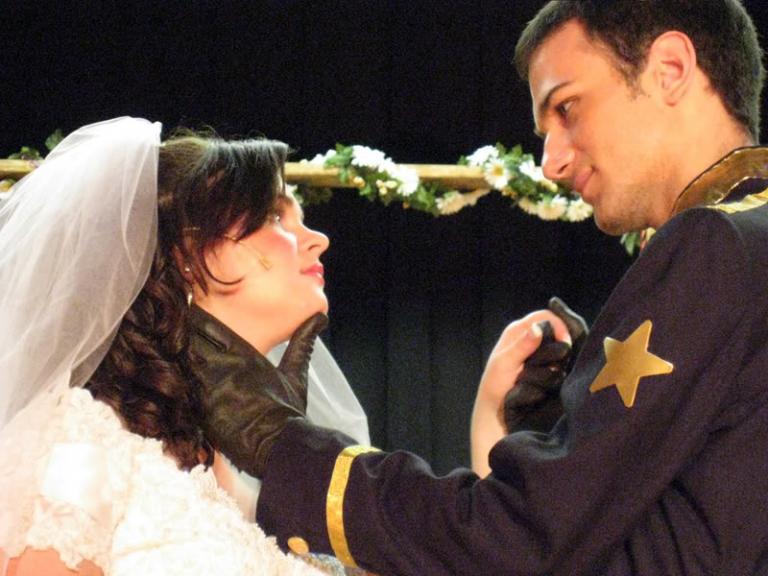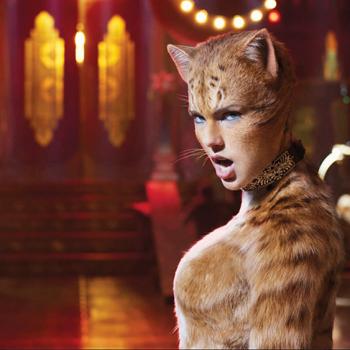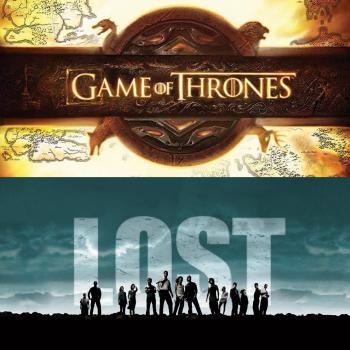
In my other life, I review Classical theatre in New York City. This past weekend, I had the pleasure of seeing Much Ado About Nothing and Trojan Women: two opposing plays, indeed! Except…
Are they really all that different?
One has a disgraced woman being given back in marriage to her abuser. And the other is The Trojan Women.
Two Stories, Both Alike In-Dignity
In Trojan Women, originally by Euripides, and here adapted by Charles Mee, the survivors of the Trojan War recount the battles they have fought, the children ripped from their arms, the indignities they’ve suffered as their city fell around them – only to have an uptight ambassador from the Greeks arrive to announce that every last woman has been given away as a “wife,” that is a prisoner of war, a slave, a sex-toy, to a Greek commander. Even the Princesses. Even the Queen. Helen of Troy, the face that launched a thousand ships, is reviled in this production as much as she was in the first, because she dares to survive. Even if that means sucking up to whatever man is strongest. Helen’s romance – that is, her right to choose a spouse – is mocked. Is the cause of everybody’s suffering. For in this world, no woman’s will should ever be her own. Cassandra also proves this: she stood up to a god, refused to be raped, and for her “sin” is punished by being disbelieved. There goes the mad, female truth-teller.
So how does Much Ado About Nothing compare? The script is problematic. As much as we all love Benedick and Beatrice – and we do! – the story actually revolves around something considerably more Trojan Women-esque than rom-commy. A young man, Claudio, comes home from war. Sees a pretty girl, Hero. Has his commanding officer acquire her for him. Is duped into thinking she has romantic autonomy, and violently denounces her for a whore on her wedding day, leaving her for dead at the altar. Later, he is challenged to various duels for his cruelty, and ultimately repents once he’s tricked into believing he caused her death. Yet the “happy ending” is that the woman he left for dead takes her volatile lover back at her father’s insistence. Yay?
The Revolution of Romance
Chalk it up to sour grapes or a surly disposition, but when it comes to matters of romance, I can become quite the elitist snob. I don’t write this to exonerate myself or this position, merely to explain that somewhere along the way I thought it far superior to scoff at Disney princesses and their chirpy “love conquers all!” attitude. After all, I thought in my practical Catholic mind, the smart woman consecrates her virginity, keeps her autonomy, and never has to deal with anything as embarrassing as calling each other cutesy names in public. Virginity! The church and hagiography told me. That’s where a woman’s power is at.
But in watching these two plays back to back, I was reminded that romance was itself a form of rebellion.
That the idea that a woman might have autonomy of choice; that she is not, in fact, property to be handed away by her father or some conquering nation; that her heart might have a place in the marriage bed; that her wants and desires were as important – more important – than her fertility; that she had every right to insist not just on the procreative element of the sacrament, but upon the unitive, too…
Suddenly, Beatrice became so much more vibrant, and Hero became so much more tragic. Suddenly, the realization that, except that Beatrice believed her cousin, and that Benedick loves Beatrice, Hero should have never been exonerated at all. That the only difference between Trojan Women and Hero’s story, is that the “modern,” unitive romance between Beatrice and Benedick forced the privileged white boy into remorse…
Well, that’s really rather subversive and revolutionary, is it not?
Belittling Autonomy
While Much Ado subverts and gives autonomy of choice at least to Beatrice, it fails ultimately by still giving Hero (with a very confusing few lines) back to the man who abused her.
In fact, this narrative is prevalent in Shakespeare’s plays, across his canon. Sylvia is nearly raped by her lover’s best friend in Two Gentlemen of Verona, one of Shakespeare’s earliest plays, yet a few lines later, the would-be rapist is forgiven and given as a prize his former lover whom he spurned. Sylvia, who was assaulted, is given no more lines – leaving the actress to just smile through her teeth and try not to scream at the Bard of Straford-upon-Avon.
Most productions of Measure for Measure have the Duke offer his hand in marriage to the nun, Isabelle, who just spent the whole play fighting for her right to be a virgin. She has no lines, and apparently is forced to acquiesce. Boom. Happy ending.
In A Winter’s Tale, the Queen Hermione is suspected by her husband of having an affair with his best friend. His reasoning for believing so is specious at best, and most actors tend to play some form of actual madness to explain why he’s suspecting the worst as early as Act I! His wife “dies,” becoming a statue. (This is one of Shakespeare’s last plays, and is a fantasy – still, like Hero, the woman must be fridged.) And when she is exonerated, silently she takes her murderous husband back.
The part I object to is the silence of it all.
It’s the ambassador from Trojan Women walking into my rom-com and telling me, politely, chirpily, that it was cute when I made decisions in the rest of the story, but it’s time for the men to divvy up the women, now. And scene.
After Happily Ever After
Shakespeare, Euripedes, and a thousand other Important Authors have used these tropes of “stopping [her] mouth with a kiss, and let [her] not speak neither.” So, do any other narratives exist? Sure, but we call those stories “girly,” “chick flicks,” “chick lit,” “fairy tales,” “Mary Sue,” “wish fulfillment.” LESS THAN.
We make fun of Snow White and Cinderella for being endlessly sparkly. But these women left a life of drudgery and struck out into the wide world, with a little help from a Huntsman or a Fairy Godmother, and for their valor were rewarded with a prince who is, to paraphrase the satirist Jane Austen, impossible to describe and so you may as well just imagine him as handsome and wonderful as you please. On the one hand, yes, men are relegated to being arm candy here. And that’s perhaps why some object, and there’s good reason to object to any human being treated as a prize. But in the nature of allegory, Prince Charming doesn’t represent marriage or manhood: he represents stability, escape, autonomy – choice.
In some of my favorite and more obscure fairy tales, there’s an investment in the relationship itself. As in Beauty and the Beast, there’s interest in what happens after two characters meet. In what happens after “happily ever after.” In King Thrushbeard, two vastly proud people are married (after some deceptions on his part, alas). Yet, they spend the rest of the story sorting out how to live as normal people, until it’s finally revealed that he was a king all along, and she can assume the throne now that neither one of them is a boor.
In Thousandfurs or Deerskin, a princess escapes her incestuous, grieving father – after tricking him into giving her some substantial resources with which to survive – and flees to the neighboring country, becoming a servant. She catches the eye of the king, who realizes what an awesome woman she is, and through a series of reverse-Cinderellas, finally gets her to admit that she’s royal and could he marry her, pretty please? Also: her dad is now dead. Once again: she gets to be the Queen.
Even a grisly tale like Bluebeard can tell you what to keep an eye out for in terms of toxic relationships that looks great on your wedding day, but not so great when you find all the dead wives.
Compare this to While You Were Sleeping, where – yes, through a series of lies and hijinks – Sandra Bullock’s character finds herself simply getting to know Bill Pullman’s character, and falling in love with him So, at the midpoint twist, when the Prince Charming that Sandra Bullock thinks she wants wakes up and believes he must want her back, the beauty of her ability, her autonomy to choose – and that she chooses the reality over the fantasy of romance – is intensely satisfying.
The Danger of the Two Party System
It may be said, then, that romance as a trope has the power to give autonomy of choice to women’s narratives. Romance as a trope can also be belittled as “girly” and therefore “less than,” in an effort – often unconscious – to belittle a woman’s interest in stories about herself. But is there a germ of truth in keeping a wary eye on the perils and pitfalls of romance as a genre? Sure.
One of the greatest dangers, I think, is limiting the number of choices available to women’s narratives.
The act of choosing one’s romantic partner may have once been – may still be – an act of rebellion. But it can also lean into the false narrative, often handed to men and women, of all faiths or none, that the only two choices available are death or marriage. Either you find romance…or you die alone.
Even the love triangle trope, set up positively for the female protagonist to have more than one fate to pick from, still digs into this LOVE OR DEATH narrative. Which is why stories about other forms of love, other theodramas, other relationships are so important now. Those who do not marry are not bereft of life; and those who are in romantic entanglements are not guaranteed happiness.
In point of fact, we are all struggling towards that greatest theodrama – and this is the stuff that’s really worth writing – which is the stumbling, half-blind, towards our salvation. As strange and twisty and full of reversals and accidental meetings and harsh partings, and false starts and sudden victories and inevitable defeats, and moments of grace that make no sense and yet mean everything in the contemplation of a ladybug…that’s the stuff worth writing about, for men as well as for women. The romance of free will in all its complexity. The multiplicity of grace.
And until then, let’s keep striving to let the women speak for themselves on stage. And not belittle them when they do.
- Review of Trojan Woman
- Review of Much Ado
_____
 Image courtesy of Julie Kersting. Much Ado About Nothing, Gaudete Academy 2007. Directed by Emily C. A. Snyder. Gayle Farrington as Hero, Ryan Gonor as Claudio.
Image courtesy of Julie Kersting. Much Ado About Nothing, Gaudete Academy 2007. Directed by Emily C. A. Snyder. Gayle Farrington as Hero, Ryan Gonor as Claudio.
Want to tell the Pop Feminist what to review next? Become my patron on Patreon!












